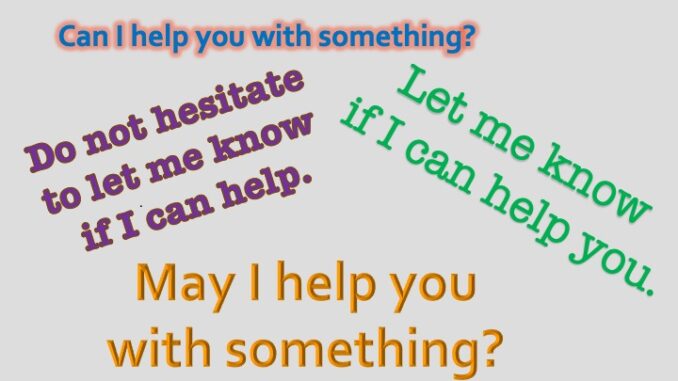
The most common remarks, such as speech etiquette formulas, are most commonly pronounced so indistinctly that a non-native speaker is hard put to make them out.
This is especially the case when the speaker mumbles and pronounces the remark in a low voice.
So, can you hear what is said here:
Trust me: it is not impossible to make out what he says.
Use your headphones, if need be.
But first, adjust the volume not to damage your eardrums.
Обратите внимание на то, что в разговорной речи нередко употребляется формула Can I help you with something? Но считается, что May I help you with something? грамматически более правильна.

Фраза Могу ли я вам как-то/чем-то помочь? в современной разговорной речи передаётся и другими способами, например:
Let me know if I can help you. Дайте мне знать (скажите / сообщите), если я могу чем-то помочь.
Do not hesitate to let me know if I can help / be of help. Не стесняйтесь обратиться за помощью.
FILL IN THE BLANKS
The most common, such as formulas, are most commonly so indistinctly that a non-native speaker is to make them out.
This is especially the when the speaker and pronounces the remark in a low .
So, can you what is said here? Trust me: it is not .
Use your , if need be.
But first, the volume not to damage your .
Do not to let me know if I can help.
me know if I can help you.
Do not to let me know if I can be of help.
Разговорная фраза: I help you with something?
Более правильная фраза: I help you with something?
VOCABULARY
adjust [ə’ʤʌst] регулировать, отрегулировать
case [keɪs] случай: this is especially the case when именно такой случай мы наблюдаем, когда / это особенно очевидно, когда / …
common [‘kɔmən] обычный, обывкновенны, простой
commonly [‘kɔmənlɪ] обычно, обыкновенно, как правило
damage [‘dæmɪʤ] v. повреждать; damage ущерб, повреждение
distinctly [dɪ’stɪŋktlɪ] отчётливо, чётко, ясно
eardrum [‘ɪədrʌm] барабанная перепонка
etiquette [‘etɪket] этикет
formula [‘fɔːmjələ] formulas, formulae [‘fɔːmjuliː] мн. ч.
hard put to do sth.: to be hard put to do sth. затрудняться: I am hard put to make words out Мне трудно разобрать слова.
headphones [‘hedfəunz] наушники
hesitate [‘hezɪteɪt] v. не решаться, колебаиться
impossible [ɪm’pɔsəbl] невозможный; possible [‘pɔsəbl] вероятный, возможный
indistinctly [ˌɪndɪ’stɪŋktlɪ] невнятно, неясно, неотчётливо distinctly отчётливо
make sth. out v. понять, (едва) разобрать (to make out – made out – made out)
mumble [‘mʌmbl] v. бормотать, нечётко говорить, бубнить
need [niːd] нужда: if need be при необходимости; to need нуждаться в
pronounce [prə’nauns] v. произносить
remark [rɪ’mɑːk] высказывание; to remark высказывать(ся)
speech [spiːʧ] речь; речевой: speech etiquette речевой этикет
trust [trʌst] v. верить, доверять(ся): Trust me! Поверьте
voice [vɔɪs] голос: in a low voice тихим голосом; негромко, тихо; in a loud [laud] voice громко
volume [‘vɔljuːm] уровень громкости




Оставьте первый комментарий